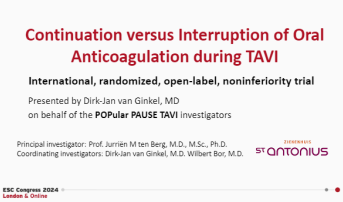Trial Challenges Continuation of Oral Anticoagulants During TAVI
POPular PAUSE TAVI bolsters what one expert says has become standard of care at most centers: interrupting treatment.

LONDON, England—If operators choose to continue a patient’s oral anticoagulation during TAVI, they are likely increasing bleeding without getting a benefit in the form of fewer thromboembolic events, the POPular PAUSE TAVI trial indicates.
The rate of a primary composite outcome of CV death, stroke, MI, major vascular complications, or major bleeding in the first 30 days after the procedure was 16.5% among patients who kept taking their oral anticoagulants and 14.8% among those who temporary interrupted treatment, a difference that failed to meet criteria for the noninferiority of the continuation strategy (P = 0.18).
Although there were no differences in thromboembolic events between trial arms, bleeding—particularly minor bleeding—was more frequently observed with continuation of oral anticoagulation.
Dirk Jan van Ginkel, MD (St. Antonius Hospital, Nieuwegein, the Netherlands), reported the results here at the European Society of Cardiology (ESC) Congress 2024.
“There was no advantage to continuing oral anticoagulation compared with interruption in patients undergoing TAVI with a need for anticoagulation,” van Ginkel said at a press conference, adding that POPular PAUSE TAVI “provides the first randomized data” backing the interruption strategy.
Senior investigator Jurriën ten Berg, MD, PhD (St. Antonius Hospital), noted that guidelines have not had much to say about what to do about oral anticoagulation in the TAVI setting and that practice varies widely across countries and hospitals.
“I think that this trial finally shows you that in general you have to interrupt in all those patients,” ten Berg said. “I think this will get into the guidelines and will be the policy to follow.”
The findings were published simultaneously online in the New England Journal of Medicine.
Increased Bleeding Without Benefit
In general, guidelines recommend temporarily stopping oral anticoagulation before an intervention in patients with a high risk for bleeding, but the issue hasn’t been well studied for those undergoing TAVI.
Thromboembolic and bleeding risks tend to be higher in this population than in others—patients undergoing PCI, for instance—due to older age; higher rates of comorbidities; the need for large-bore catheters; and the presence of atrial fibrillation (AF) requiring oral anticoagulation in about one-third of those undergoing the procedure.
There is some observational evidence suggesting that continuation of oral anticoagulation during TAVI may lower the risk of stroke without increasing bleeding, and POPular PAUSE TAVI was designed to test whether that’s true, van Ginkel said.
The noninferiority trial, conducted at 22 European sites, included 858 patients (mean age 81 years; 35% women) with an indication for oral anticoagulation who were undergoing TAVI. Investigators randomized them to periprocedural continuation or interruption of anticoagulation. Interruption occurred 48 to 120 hours before the procedure depending on the specific anticoagulant used, with treatment restarted after the procedure as soon as the operator or treating physician deemed it safe to do so.
I think this will get into the guidelines and will be the policy to follow. Jurriën ten Berg
The indication for oral anticoagulation was AF in 95% of patients. Most (82%) were on a direct oral anticoagulant, with 30.6% of those meeting criteria for a reduced dose. In the interruption group, treatment was restarted a median of 1 day after the procedure.
For the primary composite outcome, the continuation strategy failed to meet noninferiority criteria, as the upper bound of the 95% CI around the between-group risk difference exceeded 4% (risk difference 1.7%; 95% CI -3.1%-6.6%).
The rate of overall thromboembolic events was not significantly different between the continuation and interruption arms (8.8% vs 8.2%; risk difference 0.6%; 95% CI -3.1%-4.4%).
Overall bleeding, however, was more frequent with the continuation strategy (31.1% vs 21.3%; risk difference 9.8%; 95% CI 3.9%-15.6%). That was due mostly to a higher rate of minor, VARC-3 type 1 bleeding (21.6% vs 12.9%), although there was a numerically higher rate of major, VARC-3 type 2-4 bleeding as well (11.1% vs 8.9%).
There was no significant difference between the continuation and interruption arms for an early safety outcome incorporating all-cause death, stroke, major bleeding, major complications, new pacemaker implants, or surgery/intervention related to the device.
The researchers acknowledge some limitations of the trial, including the open-label design, which is associated with possible reporting and ascertainment biases; the lack of a neurologic exam or neuroimaging in all patients; and the insufficient statistical power for examining differences in the individual components of the primary outcome. Moreover, nearly all patients underwent TAVI via transfemoral access, so the results do not apply to alternate access types.
‘Not Surprised’
Commenting for TCTMD, Santiago Garcia, MD (The Christ Hospital, Cincinnati, OH), said he was not surprised by the findings and predicated that most interventional cardiologists would feel the same way. “I think a strategy of continuation of anticoagulation for procedures like TAVR which involve large-bore access is problematic,” he said, pointing to the bleeding risk.
He added that interruption of anticoagulation prior to TAVI “is what I would consider the standard of care in the US,” with treatment stopped 3 to 5 days before the procedure depending on the specific agent.
Although there’s some research suggesting that continuation of anticoagulation might be beneficial for patients undergoing various procedures in the electrophysiology lab, patients undergoing TAVI are different, Garcia said, citing their older age and the need to use large-bore catheters for arterial access.
Continuation of anticoagulation might be considered in only a “very tiny minority of patients” at this point, he said. That might include patients who have mechanical prostheses in other heart valves or those who have had a recent stroke. However, he added, even in those patients, the practice would be to stop oral anticoagulation and consider bridging with heparin or low-molecular-weight heparin.
Asked about the potential impact of the POPular PAUSE TAVI trial, Garcia said: “It may certainly give more data to include in guidance. I think the guidelines have been a little bit silent about this, . . . so now that there is data to show that one strategy appears to be superior in terms of safety to the other one, I think we may see that in the guidelines.”
But it probably won’t change practice very much since it confirms what many are already doing, he said. “It’s hard to articulate why anyone would continue to maintain these patients on anticoagulation throughout the procedure.”
Though Gilles Montalescot, MD, PhD (Hôpital Pitié-Salpêtrière, Paris, France), discussed some limitations of the trial and open questions following van Ginkel’s presentation, he said the findings support the caution around continuing anticoagulation found in some guidelines and consensus documents.
There is a simple conclusion, he said: “Patients anticoagulated for A-fib and scheduled for a TAVI procedure should have their anticoagulants stopped without low-molecular-weight heparin bridging. This recommendation should be taken by the ESC guidelines because so far we have no recommendation at the ESC level for this situation.”
Todd Neale is the Associate News Editor for TCTMD and a Senior Medical Journalist. He got his start in journalism at …
Read Full BioSources
Van Ginkel DJ, Bor WL, Aarts HM, et al. Continuation versus interruption of oral anticoagulation during TAVI. N Engl J Med. 2024;Epub ahead of print.
Disclosures
- The trial was funded by the Netherlands Organization for Health Research and Development (ZonMw) and the St. Antonius Research Fund.
- Van Ginkel reports no relevant conflicts of interest.
- Ten Berg reports receiving institutional research grants from AstraZeneca and Daiichi Sankyo; speaking fees from AstraZeneca and Boehringer Ingelheim; and travel support from Bayer.






Comments